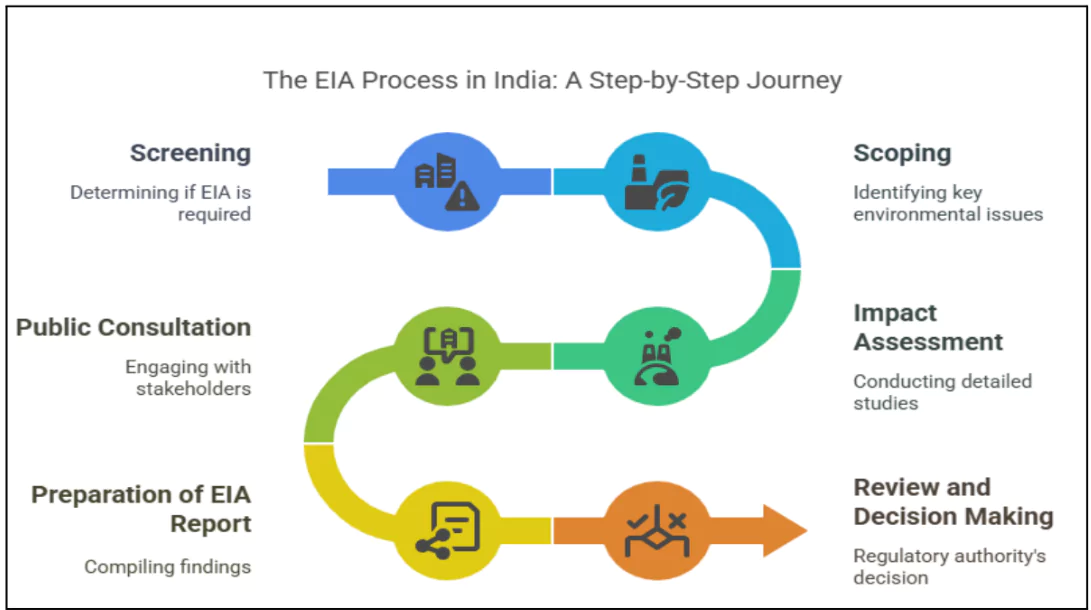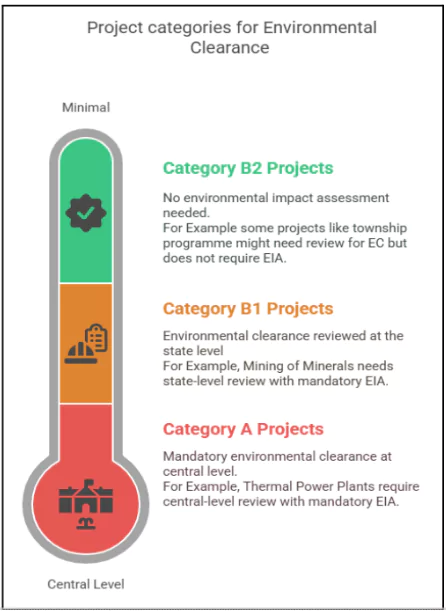The Supreme Court has ruled that retrospective Environmental Clearances (ECs) are illegal, emphasizing the need for prior ECs under Environment Impact Assessment (EIA) norms.
| Environmental Impact Assessment (EIA)
EIA is the process of determining the anticipated environmental effects of a proposed project or development, taking into account interconnected socioeconomic, cultural, and human-health aspects, both positive and negative. |
Supreme Court Judgment on Post-Facto Clearances under EIA Rules
- The Supreme Court declared the grant of ex post facto or retrospective ECs as a gross illegality and inconsistent with core environmental principles.
- The Court struck down the 2017 Notification and 2021 Office Memorandum (OM) and related circulars, which effectively permitted retrospective ECs, calling them arbitrary and unconstitutional.
- However, it upheld the validity of ECs already granted under the 2017 and 2021 instruments, thereby protecting past approvals from retrospective nullification.
“Polluter Pays” principle
- The “Polluter Pays” principle holds that those who produce pollution should bear the costs of managing it to prevent environmental damage.
- It ensures accountability by making polluters financially responsible for the harm they cause to the environment, promoting sustainable practices and legal compliance.
|

Environmental Justice vs. Ease of Business
- The judgment highlights a clear preference for environmental protection over regulatory leniency that might benefit businesses operating without clearance.
- The Court noted that the Centre had engaged in “crafty drafting” to enable retrospective clearances, thereby shielding violators from accountability.
 It warned against compromising environmental standards under the guise of facilitating development, stressing that true development includes environmental conservation.
It warned against compromising environmental standards under the guise of facilitating development, stressing that true development includes environmental conservation.- The ruling reinforces that environmental clearance must precede any construction or expansion, regardless of economic or administrative convenience.
Violation of the “Polluter Pays” Principle
- Retrospective ECs were seen as undermining the foundational “polluter pays” principle, as they retroactively legalized illegal activities without penal consequences.
- The Court observed that such clearances incentivize environmental violations by allowing entities to operate without prior scrutiny or accountability.
- Permitting post-facto ECs would normalize and institutionalize environmental violations, contrary to both law and public interest.
- The court emphasised that prior EC is vital as it involves evaluating the environmental impact before the project begins, not after damage has occurred.
Environmental Clearances in Developed Countries
- United Kingdom: Environmental clearance is granted under the Town and Country Planning Act 1990 and Environmental Impact Assessment (EIA) Regulations 2017, requiring EIAs for major projects before planning approval.
- United States: The National Environmental Policy Act (NEPA) 1969 mandates federal agencies to conduct Environmental Assessments (EA) or Environmental Impact Statements (EIS) before approving projects.
- France: Under the Environmental Code (Code de l’environnement), France mandates EIAs for classified installations and large projects, overseen by the Environmental Authority ( Autorité environnementale) to ensure ecological compliance.
|
Future Implications for Industries
- The ruling sets a significant precedent for strict regulatory compliance, compelling industries to obtain ECs before initiating any project.
- Industrial and real estate developers may face greater legal risk and project delays if they commence operations without prior environmental approval.
- The government is now legally barred from issuing retrospective ECs, which means unauthorized projects may face demolition or closure in the future.
- The judgment is likely to prompt tightened enforcement of EIA regulations and may push for greater public participation and transparency in the clearance process.
Conclusion
This landmark verdict upholds the sanctity of environmental law and sets a strong deterrent against regulatory evasion, reaffirming the judiciary’s role in ensuring sustainable development.
![]() 17 May 2025
17 May 2025


 It warned against compromising environmental standards under the guise of facilitating development, stressing that true development includes environmental conservation.
It warned against compromising environmental standards under the guise of facilitating development, stressing that true development includes environmental conservation.